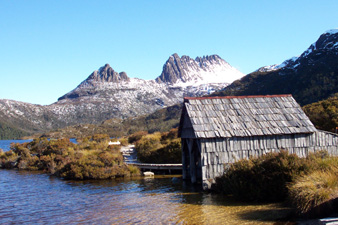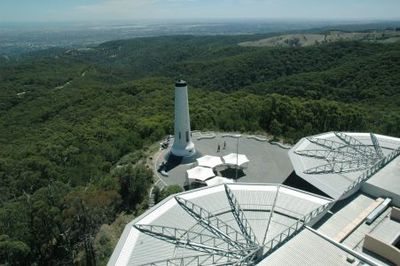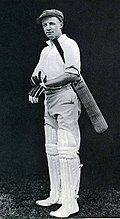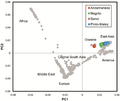Portal:Australia
| Showcase | Content | Interesting facts | Contributing |
Introduction
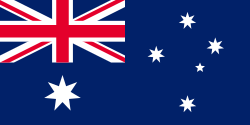
Australia, officially the Commonwealth of Australia, is a country comprising the mainland of the Australian continent, the island of Tasmania and numerous smaller islands. It has a total area of 7,688,287 km2 (2,968,464 sq mi), making it the sixth-largest country in the world and the largest in Oceania. Australia is the world's flattest and driest inhabited continent. It is a megadiverse country, and its size gives it a wide variety of landscapes and climates including deserts in the interior and tropical rainforests along the coast.
The ancestors of Aboriginal Australians began arriving from south-east Asia 50,000 to 65,000 years ago, during the last glacial period. By the time of British settlement, Aboriginal Australians spoke 250 distinct languages and had one of the oldest living cultures in the world. Australia's written history commenced with Dutch exploration of most of the coastline in the 17th century. British colonisation began in 1788 with the establishment of the penal colony of New South Wales. By the mid-19th century, most of the continent had been explored by European settlers and five additional self-governing British colonies were established, each gaining responsible government by 1890. The colonies federated in 1901, forming the Commonwealth of Australia. This continued a process of increasing autonomy from the United Kingdom, highlighted by the Statute of Westminster Adoption Act 1942, and culminating in the Australia Acts of 1986.
Australia is a federal parliamentary democracy and constitutional monarchy comprising six states and ten territories. Its population of almost 28 million is highly urbanised and heavily concentrated on the eastern seaboard. Canberra is the nation's capital, while its most populous cities are Sydney and Melbourne, both with a population of more than 5 million. Australia's culture is diverse, and the country has one of the highest foreign-born populations in the world. It has a highly developed economy and one of the highest per capita incomes globally. Its abundant natural resources and well-developed international trade relations are crucial to the country's economy. It ranks highly for quality of life, health, education, economic freedom, civil liberties and political rights.
Featured article -

Bodyline, also known as fast leg theory bowling, was a cricketing tactic devised by the English cricket team for their 1932–33 Ashes tour of Australia. It was designed to combat the extraordinary batting skill of Australia's leading batsman, Don Bradman. A bodyline delivery was one in which the cricket ball was bowled at pace, aimed at the body of the batsman in the expectation that when he defended himself with his bat, a resulting deflection could be caught by one of several fielders deliberately placed nearby on the leg side. (Full article...)
Selected biography -
Julia Eileen Gillard (born 29 September 1961) is an Australian former politician who served as the 27th prime minister of Australia from 2010 to 2013. She held office as the leader of the Labor Party (ALP), having previously served as the 13th deputy prime minister from 2007 to 2010. She is the first and only woman to hold either office in Australian history. (Full article...)
Did you know (auto-generated) -
- ... that the United Ukrainian Ballet Company, consisting of exiled dancers based in The Hague, has toured the UK, Singapore, Australia and the US?
- ... that Australian train driver Bill Morrow received the Soviet Union's Lenin Peace Prize alongside Fidel Castro?
- ... that Georgina Sutton was the first woman to be appointed the chief pilot of an Australian airline?
- ... that the South Australian Labor politician Ernest Roberts served two tours in South Africa during the Second Boer War?
- ... that Anna Burke was the second woman to give birth while a member of the Australian House of Representatives?
- ... that the arts magazine Paper Chained was banned in some Australian prisons due to its pen-pal program?
- ... that a dispute over paid sick leave at a chocolate factory ended up before the High Court of Australia in Mondelez v AMWU?
- ... that people traveled from as far away as Australia and the Netherlands to stay at a house in Ohio?
In the news
- 20 April 2025 –
- The death toll from drownings during the week across Australia increases to seven after a fisherman dies after being swept off rocks near Sydney. Three people remain missing and one other was injured. (Philippine Daily Inquirer)
- 7 April 2025 – Tariffs in the second Trump administration, Executive orders in the second presidency of Donald Trump
- The Nikkei 225, SSE Composite Index, and Hang Seng Index experience substantial losses following Friday’s losses on the New York Stock Exchange as a result of U.S. president Donald Trump's tariffs. European markets also decline, particularly in banking and defense sectors. The ASX 200 in Australia and the Kospi in South Korea also closes lower. (BBC News)
- 2 April 2025 – Tariffs in the second Trump administration
- In the 10% tariff, the U.S. lists the Australian territory of Heard Island and McDonald Islands near Antarctica, despite the fact that it has no human inhabitants, imports or exports. In response to finding these islands in the list, Australian prime minister Anthony Albanese commented that "Nowhere on earth is safe" for the tariff. (The Guardian)
- 31 March 2025 – Australia–North Korea relations
- The Royal Australian Air Force deploys a long-range maritime patrol aircraft P-8 Poseidon to Kadena Air Base in Okinawa Prefecture, Japan, to monitor North Korean maritime activities in the Yellow Sea, including weapons shipments prohibited under international sanctions. (NK News)
- 8 March 2025 – 2024–25 Australian region cyclone season
- Cyclone Alfred
- One person is confirmed killed and thirteen others are injured in floods caused by Cyclone Alfred as it passes through Queensland and New South Wales, Australia. (AP)
Selected pictures -
On this day

- 1770 – Having died of tuberculosis on April 30, Forby Sutherland is buried at Kurnell, New South Wales, becoming the first British subject buried in Australia.
- 1802 – Explorer Matthew Flinders becomes the first European to climb the You Yangs, a series of granite ridges above the Werribee Plain in Victoria.
- 1891 – The first May Day marches in Australia are held at Barcaldine, Queensland, in support of a shearers' strike.
- 1946 – The Pilbara strike commences with 800 Aboriginal pastoral workers walking off stations in the Pilbara and Kimberley regions of Western Australia.
- 1997 – HM Prison Pentridge (entrance gates pictured) in Coburg, Victoria, the site of the last execution in Australia, closes after 145 years of operation.
General images
Topics
More portals
WikiProject
 |
 |

| |
Consider joining WikiProject Australia, a WikiProject dedicated to improving Wikipedia's coverage of topics related to Australia. The project page and its subpages contain suggestions on formatting and style of articles, which can be discussed at the project's notice board. To participate, simply add your name to the project members page.
As of 1 May 2025, there are 208,201 articles within the scope of WikiProject Australia, of which 598 are featured and 895 are good articles. This makes up 2.98% of the articles on Wikipedia, 5.26% of all featured articles and lists, and 2.15% of all good articles (see WP:AUSFG). Including non-article pages, such as talk pages, redirects, categories, etc., there are 416,402 pages in the project.
Associated Wikimedia
The following Wikimedia Foundation sister projects provide more on this subject:
-
Commons
Free media repository -
Wikibooks
Free textbooks and manuals -
Wikidata
Free knowledge base -
Wikinews
Free-content news -
Wikiquote
Collection of quotations -
Wikisource
Free-content library -
Wikiversity
Free learning tools -
Wikivoyage
Free travel guide -
Wiktionary
Dictionary and thesaurus






